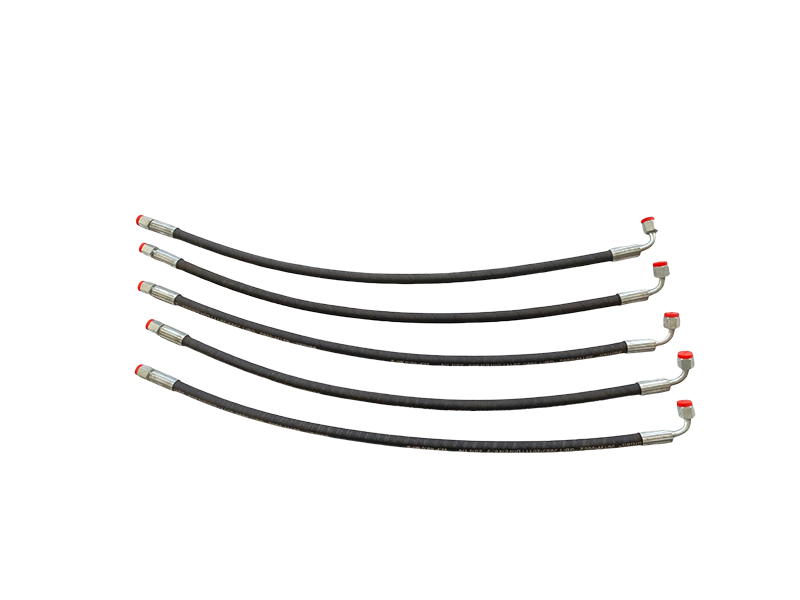news center
How to Choose the Right Oil Filter Pipe for Your Filtration Needs
2024-12-07
How to Choose the Right Oil Filter Pipe for Your Filtration Needs
Table of Contents
- 1. Introduction to Oil Filter Pipes
- 2. Importance of Choosing the Right Oil Filter Pipe
- 3. Types of Oil Filter Pipes
- 4. Materials Used in Oil Filter Pipes
- 5. Key Specifications to Consider
- 6. Maintenance Tips for Oil Filter Pipes
- 7. Troubleshooting Common Issues
- 8. Frequently Asked Questions
- 9. Conclusion
1. Introduction to Oil Filter Pipes
In the realm of **industrial filtration systems**, oil filter pipes play a crucial role in maintaining the efficiency and longevity of machinery. These components are designed to eliminate contaminants from oil, ensuring that engines and other machinery operate smoothly. Understanding how to select the right oil filter pipe is essential for achieving optimal filtration results and enhancing the performance of your equipment.
2. Importance of Choosing the Right Oil Filter Pipe
Choosing the right oil filter pipe is not merely a matter of preference; it can significantly affect operational efficiency, maintenance costs, and the lifespan of your equipment. An incorrect selection can lead to ineffective filtration, increased wear and tear on machinery, and potential failures. Therefore, making an informed choice is vital to ensure that your filtration system meets your specific needs.
3. Types of Oil Filter Pipes
When selecting an oil filter pipe, it is essential to consider the different types available on the market. Understanding the distinctions can help you make a more informed choice.
3.1 Mechanical Oil Filters
Mechanical oil filters operate using physical barriers to trap contaminants. They often feature paper or fabric elements and are easy to replace, making them a popular choice for many industrial applications. Their simplicity and effectiveness make them suitable for general filtration tasks.
3.2 Magnetic Oil Filters
Magnetic oil filters utilize magnets to attract and trap metal particles from the oil. These filters are particularly useful in environments where metal shavings can contaminate the oil. By removing these particles, magnetic filters help to prolong the life of the engine and improve overall efficiency.
3.3 Electromagnetic Oil Filters
Electromagnetic oil filters combine the principles of magnetic filtration with advanced technology to provide superior filtration. These filters can capture smaller particles and are often used in high-performance applications where precision is critical.
4. Materials Used in Oil Filter Pipes
The material of the oil filter pipe is a crucial factor that impacts its durability and performance. Here, we explore the most common materials used in oil filter pipes.
4.1 Steel
Steel is a robust and durable material often used in industrial oil filter pipes. It provides excellent resistance to high temperatures and pressures, making it suitable for heavy-duty applications. However, it can be prone to corrosion if not properly maintained.
4.2 Aluminum
Aluminum is lightweight and resistant to corrosion, making it an attractive alternative to steel in certain applications. Aluminum oil filter pipes are ideal for situations where weight reduction is crucial, such as in automotive or aviation industries.
4.3 Plastic
Plastic oil filter pipes are cost-effective and resistant to many chemicals. They are lightweight and can be easily molded into various shapes. However, they may not withstand high pressures as effectively as metal options.
5. Key Specifications to Consider
When selecting an oil filter pipe, keep these specifications in mind to ensure it meets your needs:
- **Flow Rate**: The flow rate determines how much oil can pass through the filter at any given time. A higher flow rate is essential for high-performance engines.
- **Filtration Efficiency**: This indicates the ability of the filter to remove contaminants. Look for filters that can capture particles of varying sizes.
- **Pressure Rating**: The pressure rating indicates the maximum pressure the filter can handle. Ensure this matches the requirements of your system.
- **Temperature Range**: Different materials and designs handle temperature variations differently. Choose one that can withstand the temperatures your system may encounter.
6. Maintenance Tips for Oil Filter Pipes
Proper maintenance of oil filter pipes is essential for ensuring their longevity and effectiveness. Here are some tips:
- **Regular Inspection**: Regularly inspect the oil filter pipe for signs of wear or damage. Early detection can prevent more significant issues.
- **Change Filters**: Replace filters according to the manufacturer's recommendations or when you notice a drop in performance.
- **Clean the System**: Periodically clean the entire filtration system to remove any buildup of contaminants that may affect performance.
7. Troubleshooting Common Issues
Even with proper maintenance, issues can arise. Common problems include:
- **Clogged Filters**: If you notice reduced flow or performance, the filter may be clogged. Replace or clean the filter as needed.
- **Leaking Pipes**: Check for leaks in the connections and seals. Tighten or replace damaged parts to ensure a proper seal.
- **Unusual Noise**: If the system produces unusual sounds, it may indicate a malfunction. Inspect the filter and associated components for issues.
8. Frequently Asked Questions
What is the difference between mechanical and magnetic filters?
Mechanical filters use physical barriers, while magnetic filters employ magnets to capture metal particles. Each has its specific applications and benefits.
How often should oil filter pipes be replaced?
The replacement frequency depends on usage and manufacturer guidelines. Generally, it’s advisable to inspect and possibly replace filters every 3 to 6 months.
Can I use a plastic oil filter in high-temperature applications?
Plastic filters may not withstand high temperatures as well as metal options. Always check the specifications to ensure suitability for your application.
What are the signs of a clogged oil filter?
Common signs include reduced engine performance, unusual noises, or warning lights on your dashboard indicating low oil pressure.
Are there any specific brands you recommend for oil filter pipes?
While there are many reputable brands, it's best to choose one that meets your specific requirements and has good reviews regarding reliability and performance.
9. Conclusion
Selecting the right oil filter pipe is paramount for ensuring the efficiency and longevity of your filtration system. By understanding the various types, materials, specifications, and maintenance practices, we can make informed decisions that enhance our machinery’s performance. Whether you're operating in industrial settings or automotive applications, a well-chosen oil filter pipe can significantly impact your system's reliability, ultimately leading to enhanced productivity and reduced costs. Remember, investing time in the selection process is essential for achieving optimal results in your filtration needs.
关键词
High Pressure Oil Pipe
High Pressure Hard Pipe
High Pressure Hydraulic Hose
Hotline
Add: Changfa Industrial Park, Lijia Town, Wujin District, Changzhou City
Fax: 86-519-8969086
language
English
العربية
বাংলাদেশ
Български
Hrvatski
Česky
Dansk
Nederland
 Esperanto
Esperanto
Slovenski
Filipino
Suomi
Français
Maori
 Shqiptare
Shqiptare
Georgian
 Euskara
Euskara
Deutsch
Ελλάδα
ישראל
इंडिया
Magyarország
Ísland
Indonesia
Irlanda
Italia
日本語
Sovensko
Հայաստան
한국
Kyrgyz
ປະເທດລາວ
 Zulu
Zulu
Latvian
Lithuanian
Luxembourgish
 Latinus
Latinus
Macedonian
Малайская
Maltese
Монгол улс
 Cymraeg
Cymraeg
ဗမာ
 தமிழ்
தமிழ்
नेपाल
Norge
ایران
Polska
Portugal
România
Российская
Србија
 Slovak
Slovak
Србија
 Slovak
Slovak
Bosanski
Slovenian
Беларус
España
Sverige
Точик
ประเทศไทย
Türk
Azərbaycan
Uzbek
 Afrikaans
Afrikaans
Việt Nam
Follow Us

Copyright©2022 Changzhou Guande Machinery Co., Ltd Powered by www.300.cn
Copyright©2022 Changzhou Guande Machinery Co., Ltd
This website already supports IPV6 | SEO | Cloud information



